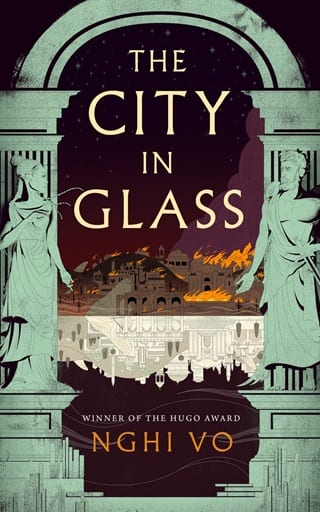Chapter Thirteen
THIRTEEN
Vitrine worked for decades without raising her head. Some of the work she did with cart and hastily broken feral horses, perhaps the children and grandchildren of the bay she had sent up the river. The work strained her muscles and left her skin as dry as ash and peeling like diseased bark, and sometimes she went to stand in the mud of the river so that she could remember that she was indeed a living thing that could bend without crackling.
After the buildings came down, the foundations of Azril had been bared, and there were a few surprises waiting for her when she uncovered them.
One day not long after the equinox, when the days were clipped shorter and shorter, she found the sigil of one of her brothers etched in the stone underneath the city. The pavers and packed dirt and then the real soil had pulled back like lips from teeth, and in the pale and gleaming bedrock underneath, she saw a series of familiar curves that made her eyes water and her mouth go dry.
A human seeing that name would have gone mad, but for Vitrine, it was only her brother’s name, Gallimane, the harvester at the end of the row. At first Vitrine didn’t believe it, and she had to clear out all the soil and sediment to reveal his name in its entirety. She stood at the center of a sigil that would sprawl a good city block, and wondered.
Gallimane was older than she was, old enough he might have been her father. He had been missing for some time now, and whether he was trapped, lost, or only sleeping, there were none who could say. He was a favorite of warlords and poets alike, so handsome that people grew sick of the sun for love of him, and so tall he liked to put his hand on the top of Vitrine’s skull to show her how very small she was.
She missed her brother a great deal, and she traced her foot along a curve of his sigil, bent down to see if she could taste any of the ash from when it had been burnt. He had been missing for a century or more now, and he might stay gone for twice that, or he might pop up again, full of stories and with gifts for each one of them, good things to eat or to hide or to rip.
“So you were here too,” she murmured. “You did not love this place as I did, but you loved it at least a little, didn’t you, to leave your mark here?”
He was silent, still missing, and she demolished his sigil, thinking absently that that was why this district always seemed to breed riots. In general, avarice and cruelty would do that well enough on their own, and it was hardly as if Azril was short on those things, but there was always something about Swallow Street and the Hesters that was inclined to crack and let all of the resentment and grief and pain go spilling out onto the streets with the blood and the brains. Once or twice, when it grew very bad, and people threw each other out the windows from nooses made of torn silk shifts, she had wondered if there was something particularly cursed or haunted about the ground, but the ghosts, new and old, were as puzzled as she was.
A year or so later, looking for a place to get dry from the whipping winter storm, Vitrine found her way to a shielded basement on Ouster Street. She had chosen the stairs leading into the ground randomly and she was pleased enough to find a crate of dominion dated to the year before Azril fell. She sat on the clay floor in the dark, burning fresh wood because the old was beginning to rot away, and on the second bottle—grassy, sweet, and imbued with a hint of wood-like grape stems—she was startled to hear the soft and bell-like sound of singing.
When the angels spoke, they could do it from a thousand mouths that were just one mouth. This sound, the words that spoke holy like the buzz of a mosquito in her ear, was one mouth separated from the rest, lonely and calling for so long that it had forgotten it wasn’t supposed to be lonely.
Vitrine squinted at the bottle, wondering hazily if she had drunk something that she should not have, drank some more to be sure, and then she fell on the ground, feeling through the tangle of dust and tiny bones and cast insect husks. Finally, she barked her fingers against the lid of a cistern, so long closed up the lid crumbled even as she grasped it. A portion of the lid fell down the shaft, and when she could not hear a splash, Vitrine shrugged and allowed herself to tumble headlong in as well.
This is how you conquer new worlds, she thought as she fell. This is how you break yourself into a thousand pieces that are all equally wrong and unloved.
She landed gently because she didn’t wish to break into a thousand pieces, and a tingle in her bare feet made her jump. It was a gnawing kind of ache, one that would grow unbearable if she stood in place for so long, and so lifting one foot and the other, she reached down to touch the ground. Save for the litter she had dropped from above, it was mostly clear except for a fine and granular dust, and when she brought some curiously to her face, she smelled benjamin and balsam, crisp with just a tinge of iron, and the singing grew louder, as if it suddenly recalled joy and what it was for.
“Oh,” she said in surprise. “You used to be an angel.”
Vitrine hesitated, and then she said the word, the real word for which angel was only an imperfect stand-in. The golden dust hummed in joy, giving thanks as much as dust could give thanks, and Vitrine rubbed her fingers clean with a frown.
This block, she remembered, was always trouble. It did not birth riots like the place where she had found her brother’s name written; it was trouble of a more inward kind. Like every city, Azril folded over itself and twisted around over the years. More often than it had been anything else, this place had been a bookbinders district. This area bled ink for love, for pathos, for rousing ballads, and for stirring tirades against those in power.
Blood spilled like ink and ink spilled like blood, she had thought more than once. Perhaps this dust that had once been an angel—and what process had that been, what suicide, what willing blindness, or what failure—had some thing to do with it. Nothing of the world could kill an angel, so it must have been his own maker turned against him.
Even from the bottom of a cistern, Vitrine could call the wind, and she did so now, letting it shift the singing dust and ruffle her clothes. The movement of the air felt good on her wine-sweated skin, and she took several long breaths. She considered what it might be like to scatter an angel or what was left of one. Would the blood continue singing its holiness so softly that only gnats and lice could hear? Would it dissipate to render sacred strange and unlikely things?
In the end, she let the wind circle but then sent it to the harbor instead where it would play tug-of-war with the tides. The golden dust she swept up with a common broom and dustpan, taking a certain pleasure in the fact that the remnants of an angel were mixed now with powdered mouse bones, cast-off spider molts, and common dust from the walls. She swept everything up into a pile at the center of the floor, and then she summoned the wind again, this time to whirl every grain and every particle into a large glass bottle sitting at the rear of the chamber.
Instead of corking it, Vitrine brought the bottle’s narrow neck to her lips and blew hot and careful. At first there was only her breath whistling over the glass aperture, and then she heated the mouth of the bottle so that it went molten and soft, falling in on itself and going shapeless until the bottle was closed off. She had done the job so neatly that the glass below the neck stayed cool, and the curlicue design of the melusine seducing the young monk on the bottle’s face was entirely intact.
Vitrine held the bottle for a short while, thinking for the first time of the angel, properly, she supposed, her angel, out in the world. He had said that he was not allowed to return home, and if she were entirely honest with herself, she had no idea what angels did with themselves when they were not singing praises or raining down fire.
She pondered it as she hauled the jar up out of the cistern and then west to the place the mansions of the great had once been. Soon enough, it would only be the western region of the city. The mansions had gone—the angel’s earthquake had left them shattered.
Despite the lack of stone lions and courtyard walls studded with rough garnet, she found her way easily to the burying ground of her far-ranging Mercers and to the place where years before, the angel had buried a crane girl sacrificed to her anger and her appetite.
As she dug a deep hole in the ground, her mouth stung a little as if to admonish her, and she shrugged it off. She was a demon, and she liked the taste of flesh. Of course she would take it where she could, especially when it had offended her.
There was no thought in her head of laying what had been an angel to rest. No, she was a black squirrel scraping out a shallow cache for later. She didn’t know who might want dust that had once been an angel, strange and volatile stuff that could sing praises and find delight in the world, but she had the idea that sooner or later, someone would. Then she could whisper in their ear, take their sleeve and draw them to this place that had once been a graveyard and now was next to nothing. She would watch as they dug up their prize, and then who knew what in the world they would make of it, what gift and what disaster?
She thought of Chanda, nurturing her poison, and of Isra, who clung so hard to the bulbs because even if she believed that she could not begin again, she had believed that they would. Vitrine shook her head.
She was no guardian and no gardener, no matter what she might once have thought. Instead she was a demon, the demon of Azril, and she planted a jar of singing dust that had been an angel deep in the earth. When she was done, she hesitated and laid her hand over it.
Still the dust sang, and she pulled her hand away.
Well, she thought. We shall see what will grow from that, won’t we?
 Fullepub
Fullepub 



